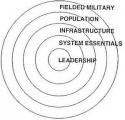From my outsider POV, it looks like one generally gets (approximately) 30 years on active duty before you're retired. Combine that with age limits, probably less.
And meanwhile I see 70 year olds running marathons and such so often it barely makes the news.
...Might a "good first step" be to eliminate time-in-service and age restrictions, and instead base mandatory retirement on health factors? It really does seem like as soon as someone makes a degree of headway, they hit the age limit and are retired.




 I have a question for all. First the importance of Military Police in SASO seems to have been down played. By that I mean instead of tasking other units to do this or creating a multi-purpose Artillery unit, why don't we just increase the size of MP units?
I have a question for all. First the importance of Military Police in SASO seems to have been down played. By that I mean instead of tasking other units to do this or creating a multi-purpose Artillery unit, why don't we just increase the size of MP units?
 Why indeed should senior officers have to be up-or-out by 55 (at the latest), never mind junior officers that are automatically tossed if they don't make Major within 10 years? The present system was based on what was introduced to clear out the deadwood back in the early days of WWII, but is based on more of a corporate (ie. individual career track) rather than an institutional model.
Why indeed should senior officers have to be up-or-out by 55 (at the latest), never mind junior officers that are automatically tossed if they don't make Major within 10 years? The present system was based on what was introduced to clear out the deadwood back in the early days of WWII, but is based on more of a corporate (ie. individual career track) rather than an institutional model. 


 ).
).










Bookmarks